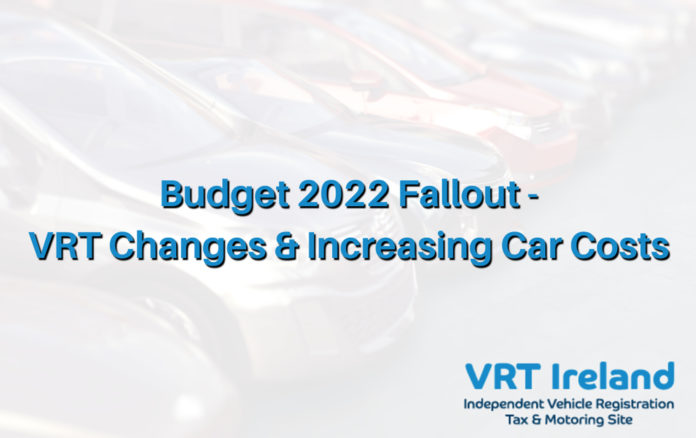
Budget 2022 placed a strong emphasis once again on the incentivisation of electric vehicles, with Finance Minister Pascal Donohoe extending the current €5,000 relief for Battery Electric Vehicles until the end of 2023.
However, the price of second-hand vehicles is set to rise again, having already risen 6% this year alone – But why? Simply put, VRT has increased on older, ‘dirtier’ car models and this coupled with the impact of Brexit means motor prices have shot up.
2022 VRT RATES – VALID FROM 1/1/2022
| BAND | FROM | TO | VRT Rate 2022 | VRT Rate 2021 |
| 1 | 0 | 50 | 7.00% | 7.00% |
| 2 | 51 | 80 | 9.00% | 9.00% |
| 3 | 81 | 85 | 9.75% | 9.75% |
| 4 | 86 | 90 | 10.50% | 10.50% |
| 5 | 91 | 95 | 11.25% | 11.25% |
| 6 | 96 | 100 | 12.00% | 12.00% |
| 7 | 101 | 105 | 12.75% | 12.75% |
| 8 | 106 | 110 | 13.50% | 13.50% |
| 9 | 111 | 115 | 15.25% | 14.25% |
| 10 | 116 | 120 | 16.00% | 15.00% |
| 11 | 121 | 125 | 16.75% | 15.75% |
| 12 | 126 | 130 | 17.50% | 16.50% |
| 13 | 131 | 135 | 19.25% | 17.25% |
| 14 | 136 | 140 | 20.00% | 18.00% |
| 15 | 141 | 145 | 21.50% | 19.50% |
| 16 | 146 | 150 | 25.00% | 21.00% |
| 17 | 151 | 155 | 27.50% | 23.50% |
| 18 | 156 | 170 | 30.00% | 26.00% |
| 19 | 171 | 190 | 35.00% | 31.00% |
| 20 | >191 | 41.00% | 37.00% |
For cars with emissions between 101g/km to 105g/km you can expect to add another €604 onto the cost, larger vehicles with emissions over 191g/km could have a huge €8765 throw onto the overall price.
“It’s all going to come down to emissions” notes Patrick Barry of VRT.ie. “Your VRT can be as low as around 7% for low emission vehicles, or as high as 37% for higher emission cars. Technically, if you buy an electric vehicle your VRT can come to €0 when all the various reliefs are factored in – On the flip side of this, if you buy a diesel car with high emissions your VRT can fall under that 37% bracket and you could also be charged something called a Nitrous Oxide (NOx) levy – This takes into account the amount of emissions produced per kilometre, with a maximum levy of €4850 for diesel vehicles, leaving you with a hefty bill.”
The impact of Brexit has severely impacted not just the importing of the cars to Ireland from the UK, but also the costs. Between changing VRT regulations and the introduction of more red tape, Barry notes you can be severely stung without choosing the right vehicle to import –
“Due to Brexit you now have to pay VAT of 23% when you import a car from the UK to Ireland – There is no way around this, therefore you need to narrow your search to VAT qualifying cars in the UK as these can be sold to you excluding UK VAT. Similarly, you are now required to pay a 10% customs duty on the import, unless the car is manufactured in the UK, then it qualifies for preferential origin and a rate of 0%.
“Alternatively, there is the returned goods relief. If a car is imported back to the EU within 3 years of being originally exported, it will qualify for a returned goods relief and be subjected to 0% customs. For example, if a car was exported from Germany in 2019 and then imported to Ireland in 2021 it will be subject to a 0% customs duty.”
When you put all of these factors together, the difference in costs is staggering –
“If you compare a 2009 Volkswagen Golf Diesel against its 2019 Electric counterpart, you’ll be looking at €4003 in net tax to be paid in comparison to the €550 due on the electric model. €2425 of the tax costs on the Diesel model is the NOX levy alone.”
Although the number of vehicles crossing the Irish sea and into the Republic has reduced, there are still a significant number of vehicles making the trip, around 5’000 per month. The increased legislation around Brexit has led to what was a relatively simple task now becoming hugely convoluted
“Originally if you brought a car over from the UK you simply had to pay your VRT, then book an appointment at your local NCT centre and register the vehicle, now it is more complex than that, particularly the customs declaration. You need a customs expert to complete the customs declaration. We launched our Customs Clearance Agent service earlier this year which handles the entire customs declaration process for our clients.”
The good news is if you’re importing a car from the UK into Ireland there’s still bargains to be had, you just really need to do your research and enlist some expert assistance.
Firstly, you’ve got to find the right car. The used car marketplace in the UK is still chocked full of variety. You can find cars for sale through various car auctions, sites, supermarkets, dealerships and more however do be careful as there are unfortunately bad actors out there who will make a grab for your cash without hesitation.
Next, you’ll have to estimate the total costs. Brexit means you are now required to pay Customs, VAT, VRT & the aforementioned NOX Levy, you can use the VRT.ie UK to Ireland Import Cost Calculator to estimate how much you will be charged. You can even receive a VRT calculation by text.
Once you’ve received this report, you’ll need to grab a vehicle history check – This will confirm your cars details, including previous owners, manufacture date, initial registration and more. Perhaps more importantly it will also inform you if the vehicle has any red flags attached, such as having outstanding finance on the car, be of current interest to the police or having been registered as an insurance write off.
Once you have these reports together, it’s time to begin negotiations and purchase the vehicle, be sure to check the foreign exchange rate and get as good of a deal as possible. You can then have your car delivered or alternatively you can head over to the UK yourself and collect the vehicle.
Now the most complicated part of the process begins. Currently you are required to VAT at a rate of 23% when importing a vehicle from the UK into Ireland. Then comes the Customs Duty, you now are obliged to complete a customs declaration form when importing a car and this process is quite difficult, contact one of our Customs Clearance Agents for assistance. Currently the customs duty on a vehicle imported from the UK to Ireland is 0% if the vehicle originated in the UK, if the vehicle has originated out of the UK the customs duty is 10%.
Once this potential minefield has been navigated, you now have to book an appointment at your local NCT Centre within 7 days of the vehicle arriving in Ireland in order to have it registered and have your VRT paid. Remember also to change over your registration plates also as these will be necessary.











